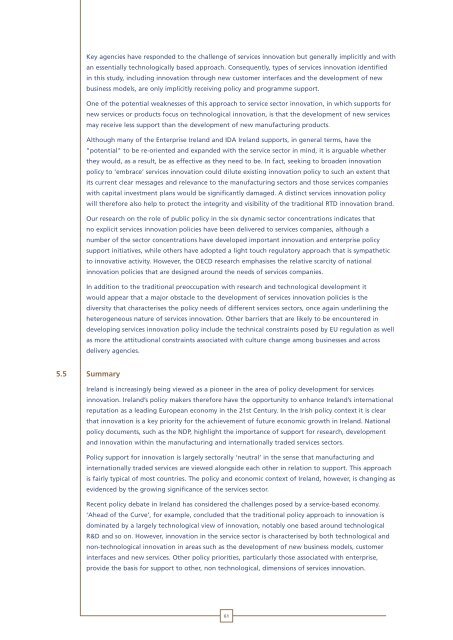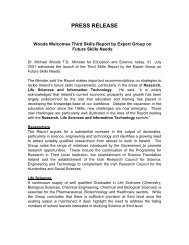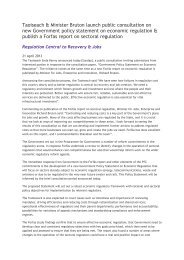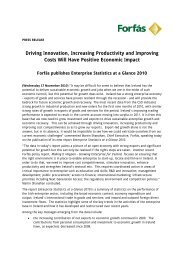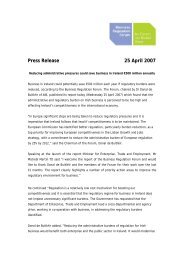Services Innovation in Ireland - Options for ... - Europe INNOVA
Services Innovation in Ireland - Options for ... - Europe INNOVA
Services Innovation in Ireland - Options for ... - Europe INNOVA
Create successful ePaper yourself
Turn your PDF publications into a flip-book with our unique Google optimized e-Paper software.
Key agencies have responded to the challenge of services <strong>in</strong>novation but generally implicitly and with<br />
an essentially technologically based approach. Consequently, types of services <strong>in</strong>novation identified<br />
<strong>in</strong> this study, <strong>in</strong>clud<strong>in</strong>g <strong>in</strong>novation through new customer <strong>in</strong>terfaces and the development of new<br />
bus<strong>in</strong>ess models, are only implicitly receiv<strong>in</strong>g policy and programme support.<br />
One of the potential weaknesses of this approach to service sector <strong>in</strong>novation, <strong>in</strong> which supports <strong>for</strong><br />
new services or products focus on technological <strong>in</strong>novation, is that the development of new services<br />
may receive less support than the development of new manufactur<strong>in</strong>g products.<br />
Although many of the Enterprise <strong>Ireland</strong> and IDA <strong>Ireland</strong> supports, <strong>in</strong> general terms, have the<br />
"potential" to be re-oriented and expanded with the service sector <strong>in</strong> m<strong>in</strong>d, it is arguable whether<br />
they would, as a result, be as effective as they need to be. In fact, seek<strong>in</strong>g to broaden <strong>in</strong>novation<br />
policy to ‘embrace’ services <strong>in</strong>novation could dilute exist<strong>in</strong>g <strong>in</strong>novation policy to such an extent that<br />
its current clear messages and relevance to the manufactur<strong>in</strong>g sectors and those services companies<br />
with capital <strong>in</strong>vestment plans would be significantly damaged. A dist<strong>in</strong>ct services <strong>in</strong>novation policy<br />
will there<strong>for</strong>e also help to protect the <strong>in</strong>tegrity and visibility of the traditional RTD <strong>in</strong>novation brand.<br />
Our research on the role of public policy <strong>in</strong> the six dynamic sector concentrations <strong>in</strong>dicates that<br />
no explicit services <strong>in</strong>novation policies have been delivered to services companies, although a<br />
number of the sector concentrations have developed important <strong>in</strong>novation and enterprise policy<br />
support <strong>in</strong>itiatives, while others have adopted a light touch regulatory approach that is sympathetic<br />
to <strong>in</strong>novative activity. However, the OECD research emphasises the relative scarcity of national<br />
<strong>in</strong>novation policies that are designed around the needs of services companies.<br />
In addition to the traditional preoccupation with research and technological development it<br />
would appear that a major obstacle to the development of services <strong>in</strong>novation policies is the<br />
diversity that characterises the policy needs of different services sectors, once aga<strong>in</strong> underl<strong>in</strong><strong>in</strong>g the<br />
heterogeneous nature of services <strong>in</strong>novation. Other barriers that are likely to be encountered <strong>in</strong><br />
develop<strong>in</strong>g services <strong>in</strong>novation policy <strong>in</strong>clude the technical constra<strong>in</strong>ts posed by EU regulation as well<br />
as more the attitudional constra<strong>in</strong>ts associated with culture change among bus<strong>in</strong>esses and across<br />
delivery agencies.<br />
5.5 Summary<br />
<strong>Ireland</strong> is <strong>in</strong>creas<strong>in</strong>gly be<strong>in</strong>g viewed as a pioneer <strong>in</strong> the area of policy development <strong>for</strong> services<br />
<strong>in</strong>novation. <strong>Ireland</strong>’s policy makers there<strong>for</strong>e have the opportunity to enhance <strong>Ireland</strong>’s <strong>in</strong>ternational<br />
reputation as a lead<strong>in</strong>g <strong>Europe</strong>an economy <strong>in</strong> the 21st Century. In the Irish policy context it is clear<br />
that <strong>in</strong>novation is a key priority <strong>for</strong> the achievement of future economic growth <strong>in</strong> <strong>Ireland</strong>. National<br />
policy documents, such as the NDP, highlight the importance of support <strong>for</strong> research, development<br />
and <strong>in</strong>novation with<strong>in</strong> the manufactur<strong>in</strong>g and <strong>in</strong>ternationally traded services sectors.<br />
Policy support <strong>for</strong> <strong>in</strong>novation is largely sectorally ‘neutral’ <strong>in</strong> the sense that manufactur<strong>in</strong>g and<br />
<strong>in</strong>ternationally traded services are viewed alongside each other <strong>in</strong> relation to support. This approach<br />
is fairly typical of most countries. The policy and economic context of <strong>Ireland</strong>, however, is chang<strong>in</strong>g as<br />
evidenced by the grow<strong>in</strong>g significance of the services sector.<br />
Recent policy debate <strong>in</strong> <strong>Ireland</strong> has considered the challenges posed by a service-based economy.<br />
‘Ahead of the Curve’, <strong>for</strong> example, concluded that the traditional policy approach to <strong>in</strong>novation is<br />
dom<strong>in</strong>ated by a largely technological view of <strong>in</strong>novation, notably one based around technological<br />
R&D and so on. However, <strong>in</strong>novation <strong>in</strong> the service sector is characterised by both technological and<br />
non-technological <strong>in</strong>novation <strong>in</strong> areas such as the development of new bus<strong>in</strong>ess models, customer<br />
<strong>in</strong>terfaces and new services. Other policy priorities, particularly those associated with enterprise,<br />
provide the basis <strong>for</strong> support to other, non technological, dimensions of services <strong>in</strong>novation.<br />
61


